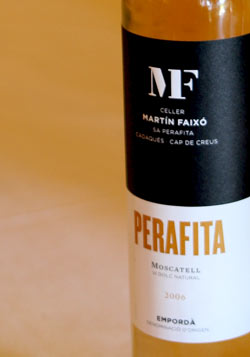 Muscatel is one of those wines that I love in sweet form, especially the Catalan Moscatell. Pictured at the right is a lovely example from Celler Martin Faixó in Cadaqués, Empordà. It’s a light, sweet, perfectly balanced dessert wine with a clean finished that’s sourced from the grapes that grow atop the mountains of Cap de Creus Park. These separate Cadaqués on the coast from the Empordà plain.
Muscatel is one of those wines that I love in sweet form, especially the Catalan Moscatell. Pictured at the right is a lovely example from Celler Martin Faixó in Cadaqués, Empordà. It’s a light, sweet, perfectly balanced dessert wine with a clean finished that’s sourced from the grapes that grow atop the mountains of Cap de Creus Park. These separate Cadaqués on the coast from the Empordà plain.
It’s a wonderful, luxuriant finish to any meal. And, while it was admittedly painful to watch such a wonderful wine be used to sweeten up some peaches at the winemaker’s restaurant one day (as opposed to sweetening up my mouth), it’s even more painful to have run across this description of where the word, “muscatel” comes from:
Muscatel comes from muscat, the kind of grape, which comes from late Latin muscatus, “having the flavor of musk”, according to the OED. And if you trace musk back through Latin muscus, Greek moschos, and Persian mušk, you find it is either derived from or cognate with Sanskrit’s muska, “scrotum” or “testicle”. Merriam-Webster goes further to say that muska is a diminuitive of mus, mouse. So “little mouse” seems to have been used euphemistically for “testicle”. This made its way to “scrotum”, and then the similarity with a deer’s musk-bag sent it on towards “musk”, and so on to modern English muscat and muscatel.
That was probably an association that could have easily have been left unknown…